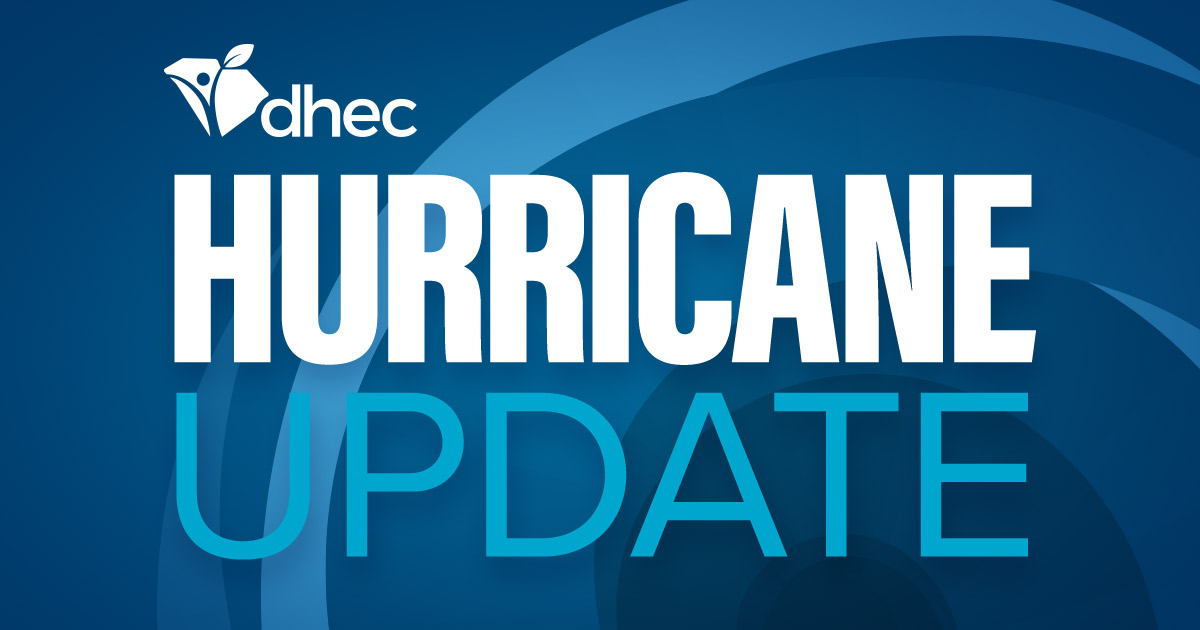Sept. 1, 2023
Final Update
Before Hurricane Idalia ever made landfall in South Carolina, DHEC’s team of dedicated employees began to prepare for the storm’s anticipated impact.
Hotlines
DHEC is here to help our state's residents. You can use these hotlines for DHEC specific needs.
- Dams Emergency Response: 803-898-1939
Call if you have an emergency that needs immediate attention at a DHEC regulated dam - Mold: 888-815-3509
While DHEC doesn't perform remediation for mold, residents can receive information about storm-related mold issues - Private Well: 888-761-5989
Provides help to private well owners
Stay Safe After the Storm
- Returning Home Safely
- Food and Water Issues
- Private Wells
- Indoor Mold
- Animal and Insect Issues
- Dam Safety
Mold
Porous materials — wood, drywall, carpet, mattresses, fabrics and furniture made of particle board — soak up water like a sponge. Items that cannot be dried thoroughly within 24-48 hours of getting wet are much more difficult to disinfect and may need to be replaced to prevent mold growth. See Indoor Mold After a Weather Event for information to help residents make decisions regarding mold in homes and workplaces.
Private Wells
Wells should be inspected after the storm for damage and any plug or covering on casing vent should be removed. For specific guidance, see Private Wells: What to Do Before and After Storms. If your private well was flooded and you have questions concerning testing, call the Private Well Hotline at 888-761-5989.
Food Safety
Illnesses caused by bacteria in food or water can be among the greatest problems caused by a hurricane or flood. Both loss of power and flooding pose a threat to your water and food supplies. In high water and flooding, food, water and utensils can be contaminated with bacteria, sewage and/or chemicals. In a power outage, frozen and refrigerated foods can be contaminated with bacteria that will grow once the temperature of the food gets above 40°F. All of this can seriously affect the health of you and your family. To reduce the risk of contamination we offer these tips.
Use Safe Water
It's important you take steps to prevent illness from unsafe water. DHEC provides tips that private well owners can take before and after a storm. If you are unsure about your water supply, use only bottled or stored water until it is determined that the water is safe to drink.
Avoid Floodwater, Beware of Hazards
Floodwater are nothing to play with or to take for granted. Exercise caution. All too often, danger lurks within and beneath floodwater and standing water.
DHEC urges everyone not to use area streams, rivers or the ocean for drinking, bathing, or swimming due to the possibility of bacteria, wastewater or other contaminants. Avoid wading through standing water due to the possibility of sharp objects, power lines or other hazardous debris that might be under the surface.
Follow these steps if you encounter floodwater or standing water.
- Avoid or limit direct contact.
- Wash your hands frequently with soap, especially before drinking and eating.
- Do not allow children to play in floodwater or play with toys contaminated with floodwater.
Turn Around, Don’t Drown!
No matter how harmless it might appear, avoid driving, wading or walking in floodwater. Just 6 inches of moving water can knock you down and one foot of moving water can sweep your vehicle away.
SC MyCoast
DHEC encourages coastal residents affected by Hurricane Ian to report damage to beachfront structures, including seawalls, revetments and dune walkovers using SC MyCoast. Residents using SC MyCoast’s Storm Witness report for the first time will need to register before submitting a report. Registration is quick, easy and free. To report through SC MyCoast, go to mycoast.org/sc.
Beach Renourishment, Sand Scraping, Sandbags
Based on storm damage reports, DHEC may issue targeted emergency orders to local governments to allow property owners along the immediate beachfront to conduct minor renourishment, sand scraping or install sandbags to provide temporary protection to beachfront structures from wave uprush. See Hurricane Idalia Recovery and Requirements to learn more.
Latest Updates
- News release issued Aug. 31, 2023: DHEC Reminds Homeowners Impacted by Idalia of Well Testing, Mold Resources Available
- News release issued Aug. 31, 2023: DHEC Reopens Shellfish Harvesting Locations from Hilton Head Island North to Edisto Island
- News release issued Aug. 31, 2023: DHEC’s Care Line Resumes Normal Hours
- News release issued Aug. 30, 2023: DHEC Closes Shellfish Harvesting Locations from Hilton Head Island North to Edisto Island
- News release issued Aug. 30, 2023: DHEC’s Public Information Care Line Now Available 24/7.
- Governor McMaster has signed Executive Order 2023-29 declaring a state of emergency and activating the state’s emergency operations plan, which enables state agencies to prepare for Hurricane Idalia's potential impact to the state.
- News release issued Aug. 29, 2023: Dam and reservoir owner-operators should monitor potential weather impacts from Hurricane Idalia.
DHEC Offices
DHEC follows the closings and delays of county offices. For example, if Beaufort County offices are closed, DHEC health clinics and offices in Beaufort County also will be closed. The latest information on delays and closures can be found at scemd.org/closings or on local news stations.
Stay Connected
Stay tuned to your local news channels, visit EMD’s website at scemd.org, download EMD’s free mobile app, and get the latest information from DHEC by following us on Twitter and Facebook.
